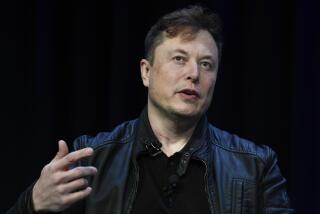Elon Musk’s massive Tesla pay package is challenged in Delaware court

Testimony began Monday in a Delaware courtroom where Tesla shareholders are challenging a pay plan for Chief Executive Elon Musk potentially worth more than $55 billion.
The suit alleges conflicts of interest on the Tesla board due to personal and professional ties to Musk. The board approved the plan in 2018. The main issue in the case is whether Musk had enough control over the board to unduly influence its creation and approval of the plan.
The lawsuit also alleges the shareholder vote to approve Musk’s pay package was based on an incomplete and misleading proxy statement. It was filed in 2018 in the Chancery Court of Delaware, the nation’s top court for handling corporate disputes.
The same court had been asked by Twitter to force Musk to buy Twitter, after Musk expressed buyer’s remorse and tried to escape the contract he had signed to pay $44 billion for the company, which turned out to be grossly overvalued after its stock price sank. The trial seemed to be going Twitter’s way when Musk abruptly ended it by announcing he would buy the company after all.
The first witness called to testify in the Tesla case was Ira Ehrenpreis, a prominent venture capitalist and longtime friend of Musk who chaired Tesla’s compensation committee when the pay package was devised.
Under the plan, Musk reaps billions if the electric car and solar panel maker hits specific market capitalization and operational milestones. For each of 12 milestones, Musk, who already owned about 22% of Tesla when the plan was approved, would receive stock equal to 1% of outstanding shares at the time of the grant. Musk’s interest in the company would grow to about 28% if the company’s market capitalization grew by $600 billion.
To date, Tesla has achieved all 12 of the market capitalization milestones and 11 operational milestones, resulting in the vesting of 11 of the grant’s 12 tranches and providing Musk more than $52.4 billion in stock option gains, according to the lawsuit. Since the grant was awarded, Tesla’s market capitalization has increased from $53 billion to more than $690 billion, having briefly hit $1 trillion early this year.
Shares of Tesla Inc. have been battered this year, like all automakers’, due to a mix of supply chain disruption and soaring inflation. Tesla shares have fallen 46% this year. Shares of Ford and GM have fallen about 31%.
But the Austin, Texas, company earned $5.5 billion in 2021, blowing away the previous year’s profit of $721 million, and it produced a record 936,000 vehicles, nearly double the number that rolled off the assembly line in 2020.
Ehrenpreis testified that much of Tesla’s success has been the result of Musk’s leadership, which he said combined bold vision with “a maniacal focus on execution.”
“He has both a bold vision, but he has been as hardworking a CEO as there can be,” Ehrenpreis said.
Under questioning from defense attorney Evan Chesler, Ehrenpreis described the nearly yearlong process under which he and other directors discussed and developed the compensation plan with the help of legal advisors and independent consultants, and input from major institutional investors.
Ehrenpreis described the milestones in the plans as “extraordinarily ambitious and difficult.”
According to minutes from a 2017 meeting of the compensation committee, the directors wanted to properly balance the motivation of “stretch” goals for Musk while avoiding “demotivating factors created by seemingly impractical, unrealistic or unachievable goals.”
Ehrenpreis also testified that his friendship with Musk played no role in his vote to approve the plan.
“I felt that it was very important to ensure Elon’s leadership in this next chapter of the company’s life,” he said, adding that it was the kind of ambitious plan that drives Musk and would create one of the most valuable companies in the world.
More to Read
Inside the business of entertainment
The Wide Shot brings you news, analysis and insights on everything from streaming wars to production — and what it all means for the future.
You may occasionally receive promotional content from the Los Angeles Times.










